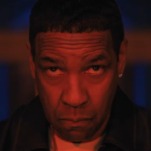The 10 Best Songs of Black Country, New Road’s Isaac Wood Era
Photo by Rosie Foster
“Welcome to the best new six-part Danish crime drama,” spoke-sang Isaac Wood circa 2019, my unforgettable introduction to the uncanny world of Black Country, New Road. Then, the U.K. buzz band had just released their stunning second single, “Sunglasses,” prompting one writer to declare them “the best in the entire world”; now, the band that released two albums in as many years effectively no longer exists. Lead vocalist, lyricist and guitarist Wood stepped aside for mental health reasons in late January, amicably departing—and heralding a new era for—the band.
Tyler Hyde (bass), Charlie Wayne (drums), Lewis Evans (saxophone), Georgia Ellery (violin), May Kershaw (keys) and Luke Mark (guitar) intend to continue recording and performing as Black Country, New Road, with new material already in the works. This isn’t their first reinvention, nor their most radical: Black Country, New Road itself sprang from the ashes of a band called Nervous Conditions, which dissolved in 2018 after vocalist Connor Browne was accused of sexual assault. Hyde, Wayne, Evans, Ellery, Kershaw and Wood stuck together then, adding Mark along the way, and they’ll do so again in Wood’s absence, although, as Hyde recently told Paste, “The door is always open to him, of course.”
The future of Black Country, New Road may be murky, the path of their “good way out of a bad place” more uncertain than ever, but the output they leave behind offers clarity and solace. The band made their debut in 2021 with For the first time and released their follow-up nearly a year to the day later—Ants From Up There has quickly become one of 2022’s most acclaimed albums. They put out a rework here and a live improvisation there. This is the band’s Wood era—18 songs, give or take—and in honor of that period’s conclusion, we’re looking back on its highest peaks.
Ranking these songs was a deceptively difficult task. Black Country, New Road don’t have throwaway tracks, nor uneven albums. Their songs are not easily defined, due to the band’s stylistic multiplicity and tendencies towards radical shifts and unusual arrangements—comparing them is sort of like trying to spot the similarities and differences between two thunderstorms. The nature of Wood’s departure certainly tints the lens through which we see these songs—as a lyricist, he was often frank (if in his own cryptic fashion) about the toll his role in the band took on him.
Ultimately, what shown through clearest of all in constructing this piece was that this is a special band—that even if Black Country, New Road never release another record, they’ll still have made an indelible mark.
10. “Athens, France”
As Black Country, New Road’s debut single, “Athens, France” laid all the band’s cards on the table from the flop, a bold exemplar of their mercurial free jazz and guitar-rock hybrid. As For the first time’s second track, though, the song obscures more than it reveals. After the feverish klezmer rave-up “Instrumental” begins the album on an overwhelming note—as if to weed out any fence-sitting listeners—the swaggering post-punk riff of “Athens, France” feels like a return to familiar territory … at least at first. Wood’s edited lyrics split the difference between the track’s single version and its album re-recording, creating a Frankenstein’s monster of arch artifice and rueful honesty (“She flies to Paris, France, I come down in her childhood bed / And write the words I’ll one day wish that I had never said”), but showing his growth as a songwriter in the process—he later deadpans that he’s “very young,” but “working on the glow-up,” and adds, alluding to perceptions that the song’s original lyrics had misogynist undertones, “It’s a great wide gulf between intentions and what ground met me.” The band toy with your expectations all the while, breaking the song’s own mold merely a minute in, and continuously transforming it through various instrumental breaks (and no chorus), sometimes slowing to a horn-forward crawl, other times bringing Ellery’s violin or a hypnotic riff to the forefront. Though it’s raw and may not cohere as well as some of the band’s later compositions, “Athens, France” was the first track to reveal the many multitudes Black Country, New Road contain.
9. “The Place Where He Inserted the Blade”
If For the first time found Black Country, New Road muscling their way up a steep incline, Ants From Up There is the band enjoying the wind in their hair as they take in the view from their new vantage point. Few tracks on their second effort make that contrast clearer than “The Place Where He Inserted the Blade,” one of the few Black Country, New Road songs that can only be described as possessing a tender beauty. Drawing inspiration from late-period Bob Dylan (“I started writing this in response to, or heavily inspired by, [2020’s] “I’ve Made Up My Mind to Give Myself to You,’” said Wood in press materials), the song grows from a bed of delicate piano, flute and guitar, building not to a thunderous stampede, but rather to a lovely singalong straight from the early Arcade Fire playbook. Lyrically, “The Place Where He Inserted the Blade” may be the sweetest song Wood has ever written: He sings about a love that offers respite from anxiety, expressing a hope that his invisible wounds will heal and declaring, “Darling, the rest of my body, it’s yours, then.” The usual dark and referential undercurrents remain—Wood’s narrator fears co-dependency (“Show me where to tie the other end of this chain”), and name-checks Kanye “Ye” West’s “Bound 2” to underscore the point. But there is a serenity to “The Place Where He Inserted the Blade” that stands alone in Black Country, New Road’s discography.
8. “Bread Song”
Lead single “Chaos Space Marine” generated quite a bit of buzz ahead of Ants From Up There, but it was second single “Bread Song” that let listeners in on Black Country, New Road’s true intentions for the album. The song starts out so delicately, it sounds like a rough touch would shatter it, opening on only Wood’s hushed fingerpicking and vulnerable vocals as he despairs of romantic disconnection exacerbated by distance and technology (“Okay, well I just woke up / And you already don’t care / That I tried my best to hold you / Through the headset that you wear”). “Bread Song” builds almost imperceptibly slowly, organized around Wood’s guitar alone through its first chorus, from which the band deliberately removed any set time signature in a display of their enthralling synchronicity. As Wayne’s percussion finally asserts itself, the tension in Wood’s lyrics spikes: “I’m ready for us to be understood,” he declares over thrumming bass and keening violin, ultimately identifying the small failure of intimacy at the core of the relationship’s collapse—the thread that, once pulled, unraveled it all. “Oh, don’t eat your toast in my bed / Oh darling, I / I never felt the crumbs until you said this place / Is not for any man / Nor particles of bread,” Wood sings, the band’s instrumentation swelling to a cheery gallop, as if to offset the quiet devastation the song depicts.
7. “Science Fair”
Perhaps the greatest trick that For the first time single “Science Fair” pulls is Hyde’s bass line, one of the most menacing pair of notes this side of the Jaws theme. That and Wayne’s tense cymbal taps—soon joined by both skronky and softly, steadily strummed guitars, and cinematic violin and sax—usher in an ever-shifting journey through the “black country” that haunts Wood’s songs. The vocalist narrates a pair of fictionalized encounters with women, both romantic misfires, at the Cambridge Science Fair and Cirque du Soleil, embedding criticism of his own lyricism within it: “I’m sorry / I have always been a liar / Just to think I could’ve left the fair with my dignity intact / And fled from the stage with the world’s second-best Slint tribute act,” he laments, later simply chanting, “References, references, references.” In between the two scenes, the band do some narration of their own, a caustic guitar solo dueling with Evans’ lip-shredding sax before textured synths and Ellery’s violin carry the track back into its second verse; that verse’s end triggers a climactic instrumental firestorm, horns and strings screaming over head-banging hard rock. “Science Fair” is the closest Black Country, New Road come to crystallizing the cause and effect of Wood’s anxiety and the songwriting it inspired, its failed attempt at escapism rendered via explosive, overwhelmingly dynamic musicianship.
6. “Opus”
One of the most instrumentally and emotionally intense songs the band have put out, “Opus” closes For the first time on a bowl-you-over kind of note. Black Country, New Road coordinate propulsive post-punk guitars, nervy klezmer horns and Wayne’s exhilarating drums throughout the seven-plus-minute song, alternating these frenzied instrumental rushes with subdued stretches in which Wood contemplates “what we built from Black Country ground,” writing the band’s own history even as he enacts it. Following a particularly hysterical violin and sax eruption about midway through the song, Wood’s voice breaks as he narrates, “What we built to keep ourselves warm / Burnt your hand and charmed the locals / All those mistakes laid out plainly / Anyone could see that the clamp was breaking me!” His climactic cry of “What we built must fall to the rising flames” is downright haunting, and the tension surrounding the singer’s outpouring of angst only continues to mount until its ultimate collapse into quiet malaise. What “Opus” may lack in melody, it more than makes up for with its wrenching high drama, shutting the door on the band’s For the first time era in bold and uncompromising fashion.
5. “Track X”
Upon its January 2021 release, “Track X” was only the fourth song Black Country, New Road had put out (after “Athens, France,” “Sunglasses” and “Science Fair”), and there was simply no precedent for its soft touch, which presaged the new direction the band would take on Ants From Up There. Wood’s deft, yet gentle electric guitar riff and Ellery’s violin plucks begin the song with a delicacy that suggests another shoe yet to drop, only it never does: The song’s straightforward arrangement provides a rise and fall, but the percussion-less instrumental never becomes so forceful that it pulls focus from Wood’s vulnerable and enigmatic vocals, as if in deference to the song’s solo acoustic origins—to which the band would later pay explicit tribute via stripped-back rework “Track X (The Guest).” Wood spends the song exploring the interconnection of his narrator’s mental state and love life, opening with the clever couplet “You’ve got great hips / I’ve been shaking ever since,” and later memorably recalling, “I told you I loved you in front of black midi.” But the song’s emotional peak is when Wood examines what’s most important during a brush with suicidal ideation, crooning, “I thought about jumping and your face when you saw / I thought of my father and proving him wrong / But mostly Mollie and Dylan and my mum,” atop fluttering sax notes, steady violin and warm guitar strums. The beauty of “Track X,” touched upon even in its title, is that Wood ultimately leaves room for the listener to take what they like from it, his musings forever incomplete over lovely backing vocals: “And I guess, in some way … ”
4. “Chaos Space Marine”
Ants From Up There’s lead single and first proper track (after the sub-one-minute “Intro”), “Chaos Space Marine” may be the single most fun and accessible song in Black Country, New Road’s catalog. Led by a jaunty horn and strings motif, and with an almost vaudevillian piano presence, the song—as Eric Bennett wrote in their review of the LP for Paste—“sounds like a British version of Dave Matthews Band; at any moment, it could break open and become ‘Satellite.’” This being Black Country, New Road, the band smuggle all kinds of idiosyncrasy into that framework nonetheless: Wood’s lyrics detail a journey across the Atlantic as a warrior, having conquered England, sets his sights on the States—a British Invasion, if you will—referencing not only The Smiths and Warhammer 40K, but also several of Ants From Up There’s own subsequent songs in quick succession (“Billie Eilish style / A Concorde will fly / Ignore the hole I’ve dug again”). Wood rejoices in “leaving this body / and […] never coming home again” in the song’s joyous choruses, the band’s singalong vocals layered over Ellery’s racing violin and Wayne’s thundering toms. Wood’s vague early warning, “In time, you will find / These things take up space inside your mind,” repeats incompletely throughout the second verse, as if his apprehension is compounding, until his climactic declaration—”So long, chumps / I’m comin’ home”—upon which the song halves its pace and eases to an end. A la Funeral-era Arcade Fire, “Chaos Space Marine” balances Black Country, New Road’s esoteric imagination with soaringly anthemic songwriting, achieving mass appeal’s scope without compromising the band’s singular vision.
3. “Sunglasses”
Like “Athens, France” before it, “Sunglasses” underwent significant changes for its inclusion on For the first time, the first of which reveals itself right away: The album version, which runs a full minute longer, spends its first 90-some-odd seconds luxuriating in electric distortion, a lone guitar working its way towards the song’s propulsive two-chord progression. Improved production creates a cavernous space within the track, sustained Hyde bass notes hanging in the air, punctured by Wayne’s snares and cymbal fills. Wood delivers his satirical first verse in a steady and subdued Sprechgesang where, on the single version, his vocals quavered theatrically, and it’s the instrumentation, rather than his voice, that strains to its limits as Wood bemoans, “I am so ignorant now, with all that I have learnt,” a moment of panic that triggers the track’s midpoint transformation. The song is at its most thrilling once it’s reconstituted as a single repeated post-punk guitar chord and 4/4 beat—just as Wood’s narrator becomes bulletproof (or tells himself he has) upon donning his sunglasses, Black Country, New Road’s performance exudes that same larger-than-life confidence, their stomping, horn-accentuated rock all the more impactful because we couldn’t see it coming.
2. “Concorde”
If there’s one specific way in which Ants From Up There raised the bar for Black Country, New Road, it’s in the sweeping, bittersweet beauty of songs like penultimate track “Concorde.” The titular supersonic airliner serves as the album’s central image, appearing across multiple tracks, and seemingly representative of the ultimate object of Wood’s narrator’s desires, among other more general concepts. Hushed electric guitar strums, spare percussion, and bright keys and saxophone accompany the singer as he delivers the most romantic chorus of his young career: “And you, like Concorde / I came, a gentle hill racer / I was breathless upon every mountain / Just to look for your light.” His narrator’s devotion is dwarfed only by the distance between him and the bliss he yearns for—he continues in the song’s lone post-chorus, “But for less than a moment / We’d share the same sky / And then Isaac will suffer / Concorde will fly.” It’s a heartbreaking image, and the band know just how long to let it hang in the air, their guitar, violin and sax all mirroring its poignance in unison. The song’s glorious post-rock climax just cements what “Concorde” has already shown for the rest of its runtime: that Black Country, New Road are at their best not when dealing in unbridled, edgy intensity, but when building dynamic, carefully designed superstructures around lyricism that braves sincerity while still telling truths slant.
1. “Basketball Shoes”
In press materials, Wood calls “Basketball Shoes,” Ants From Up There’s 12-minute closer, “the whole basis and blueprint for the album.” Indeed, the sprawling, three-part track plays out like Ants From Up There in miniature, throwing its arms around all of the album’s crashing post-rock and pretty, patient jazz sounds. Black Country, New Road return to the six-note motif of “Intro,” building it out one instrument at a time, a lone electric guitar joined by bass, then another guitar, drums, sax and violin—as if the band is assembling one last time. When Wood finally sings, he sounds as if he has made some fragile peace with his suffering: “We’re all working on ourselves, and we’re praying that the rest don’t mind how much we’ve changed / So if you see me looking strange with a fresh style / I’m still not feeling that great.” The song shifts shape soon after, Evans’ sax and twinkling chimes beautifying the void before that lone guitar and Ellery’s violin accelerate “Basketball Shoes” into another form—not yet its final. Another false ending heralds the song’s last act, a return to its opening motif via thunderous electric guitars and group vocalizations that evoke the climactic stretch of Midsommar, then one more verse, built around Wood’s final lament: “Oh, your generous loan to me, your crippling interest.” Thus ends a towering work of experimental rock—Black Country, New Road’s ultimate achievement, at least for the time being.
Scott Russell is Paste’s music editor and he’ll come up with something clever later. He’s on Twitter, if you’re into tweets: @pscottrussell.







































